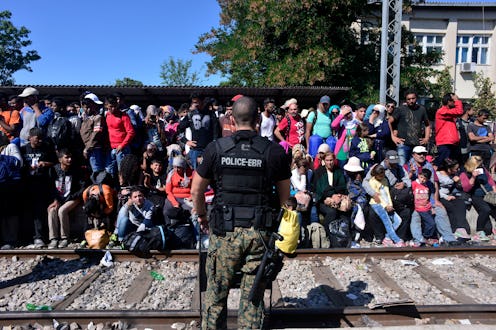News
What Is Europe Doing About The Refugee Crisis?
Europe's massive migration crisis deepened Thursday, as news that trainloads of Syrian refugees headed for the Austrian border had been diverted by local authorities, leading to a two-day standoff between police and thousands of frightened, tired, and hungry refugees. The chaos in Hungary came after news of the tragic drowning death of 12 Syrian refugees off the coast of Turkey as they tried to reach Europe — including a three-year-old boy whose body was found washed ashore. So what's the European Union doing about the refugee crisis? The frustrating truth is that there's no immediate solution in sight. Like the U.S. debate over immigration reform, Europe's leaders are at odds over how to respond to the massive number of desperate individuals and families seeking asylum in the EU.
According to the United Nations, more than 300,000 people have crossed the Mediterranean Sea so far this year in an effort to flee the poverty and disaster caused by the armed conflict in Syria, Sudan, and Iraq. A report by the International Organization for Migration said that more than 3,000 refugees died attempting to make the journey by this time last year, making it the deadliest border crossing in the world. To compare, around 230 deaths were reported along the U.S./Mexico border over the same time period.
One reason for the gridlock is that some 28 governments make up the European Union, and their resources and appetite for managing the refugees is as varied the views of the people within the countries. For example, while tensions between refugees and the Hungarian government are escalating, as officials have blocked international trains and sealed off the border to Serbia, those who are able to make it into Germany could see a much more compassionate response. German Labor and Social Affairs Minister Andrea Nahles announced this week that Germany plans to take in 800,000 refugees this year:
As one of the world's richest countries, with good infrastructure, a viable welfare state and a solid budget surplus, we are in a position to rise to the occasion.
Not all of the larger EU nations agree with that approach. Reuters reported that the program in Britain has allowed just 216 Syrian refugees, and that Prime Minister David Cameron doesn't see migration as the most viable solution to the crisis.
Other countries have reported a rise in anti-migrant protests and violence along with the rise in asylum-seekers. In France, hundreds of protesters blocked the high-speed railway leading to London. And police in Germany arrested a suspect after an attack on four refugees in Bradenburg.
In a small step to address the chaos and violence, leaders in Italy, Germany, and France announced Wednesday that they are working on a united plan to normalize asylum rules and distribute incoming Syrians. The foreign ministers presented a plan to the European Union this week to manage the millions of people seeking asylum in the northern countries. In a statement issued earlier this month, the European Commission said that a country-by-country approach is ill-suited to addressing the current issues:
There is no simple, nor single, answer to the challenges posed by migration. And nor can any Member State effectively address migration alone. It is clear that we need a new, more European approach.
In that same statement, Commission officials said they plan to take up the issue in a summit with African countries this coming November.
